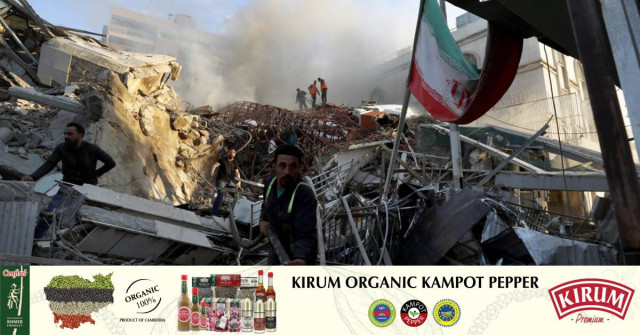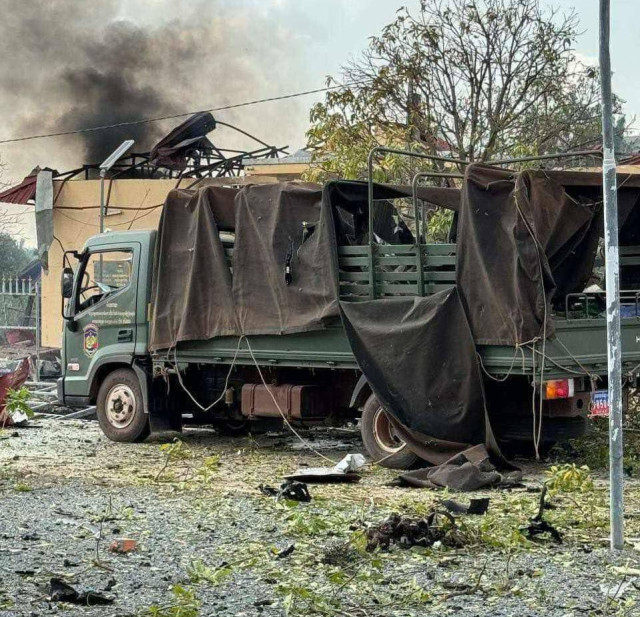US Strikes in Syria and Iraq have Biden Walking a 'Fine Line'

- By Agence France-Presse (AFP)
- February 4, 2024 9:00 AM
Washington, United States - Will the increasingly intense US military strikes in Iraq and Syria deter pro-Iranian militants there from launching new attacks?
That seems far from certain, as US President Joe Biden struggles to find a precarious balance between dissuasion and escalation.
"Will these militias actually stand down and stop their attacks on American infrastructure? The answer is most likely no," Allison McManus of the Center for American Progress, a Washington think tank, told AFP.
But, she added, these strikes mark "a significant change, and we could say a significant escalation in response to the lethal attack on US service members" and so "should not be understated."
The United States on Friday launched -- and promised to continue -- a series of strikes against elite Iranian units and pro-Iranian militant groups in Iraq and Syria, a forceful response to the January 28 attack on a US base near Jordan's border with Syria that claimed the lives of three American soldiers.
Baghdad and Damascus on Saturday denounced the strikes, while Moscow called for an emergency session of the UN Security Council, which diplomatic sources said would take place Monday afternoon.
Iran, a sworn enemy of the United States, complained that the sovereignty of Iraq and Syria had been violated, while the Palestinian militant movement Hamas, locked in a bitter war with Israel, said the strikes poured "oil on the fire."
The United States, which used long-range B-1B bombers flying from a base in Texas, declared the strikes a "success," even while insisting that it had no desire for a war with Iran.
Washington also said it had warned authorities in Iraq -- where some 2,500 US troops are based -- in advance of the strikes.
A total of 85 targets in seven sites (four in Syria and three in Iraq) were hit, including command-control and intelligence centers and facilities housing drones and missiles, according to the Pentagon.
Since mid-October, shortly after Hamas militants invaded US ally Israel, more than 165 drones and rockets have been fired at American forces in Iraq and Syria, but no US troops had been killed before the January 28 attack.
Most of the attacks on US forces have been claimed by a group calling itself the Islamic Resistance in Iraq.
Meantime, US units have been targeting the Huthi rebels in Yemen who have attacked merchant vessels in the Red Sea, a crucial maritime route.
- A 'telegraphed' response -
"With the strikes on Iraq and Syria, the Biden administration is trying to walk a fine line," Daniel Byman of the Center for Strategic and International Studies wrote in a recent issue of Foreign Policy.
"On the one hand, it seeks to end the attacks, showing both Iran and its proxies that there is a price to be paid for killing US service members and degrading their capabilities to do more attacks in the future.
"On the other hand, the administration wants to avoid escalation that could lead to an all-out war in the Middle East."
To Gordon Gray of George Washington University, "the US administration is doing everything it can to avoid getting into a broader war with Iran. For that reason, they did not strike any targets inside Iran."
But some of Biden's Republican critics insist that he should do exactly that, saying the response he crafted was too weak and too late.
"Unfortunately, the administration waited for a week and telegraphed to the world, including to Iran, the nature of our response," Mike Johnson, speaker of the US House of Representatives, said in a statement.
That, he said, "undercuts our ability to put a decisive end to the barrage of attacks endured over the past few months."
Few experts said they believed the US strikes would compel Iran -- which provides financial, materiel and military support to the militant groups but does not necessarily control them -- to change its behavior.
"The limited scale of targets the US hits, even if continued for several days, will not inflict the massive pain on Iran that would change Tehran's calculus," said Byman.
But the experts also said they saw little chance that Iran would risk a frontal conflict with the world's leading military power.
bur-lb/bpe/bbk/acb
© Agence France-Presse















